
Ludwig Wilhelm Erhard was a German politician and economist affiliated with the Christian Democratic Union (CDU), and chancellor of West Germany from 1963 until 1966. He is known for leading the West German postwar economic reforms and economic recovery in his role as Minister of Economic Affairs under Chancellor Konrad Adenauer from 1949 to 1963. During that period he promoted the concept of the social market economy, on which Germany's economic policy in the 21st century continues to be based.

Franz Müntefering is a German politician. He was Chairman of the Social Democratic Party (SPD) from 2004 to 2005 and again from 18 October 2008 to 13 November 2009. He served as the minister of Labour and Social Affairs, as well as the vice chancellor of Germany, in the cabinet of Chancellor Angela Merkel from 2005 to 2007.

Roland Koch is a German jurist and former conservative politician of the Christian Democratic Union (CDU). He was the 7th Minister President of Hesse from 7 April 1999, immediately becoming the 53rd President of the Bundesrat, completing the term begun by his predecessor as Minister President, Hans Eichel, until his resignation on 31 August 2010. During his time in office, Koch was widely regarded as one of Chancellor Angela Merkel's main rivals within the CDU.
The social market economy, also called Rhine capitalism, Rhine-Alpine capitalism, the Rhenish model, and social capitalism, is a socioeconomic model combining a free-market capitalist economic system alongside social policies and enough regulation to establish both fair competition within the market and generally a welfare state. It is sometimes classified as a regulated market economy. The social market economy was originally promoted and implemented in West Germany by the Christian Democratic Union under Chancellor Konrad Adenauer in 1949 and today it is used by ordoliberals, social liberals and modern (non-Marxist) social democrats alike. Its origins can be traced to the interwar Freiburg school of economic thought.

Joachim-Friedrich Martin Josef Merz is a German politician serving as Leader of the Christian Democratic Union (CDU) since 31 January 2022 and as leader of the Union parliamentary group as well as the Leader of the Opposition in the Bundestag since 15 February 2022.

Alfred Müller-Armack was a German economist and politician. He coined the term "social market economy" in 1946.

Dorothee Gisela Renate Maria Bär is a German politician of the Christian Social Union of Bavaria (CSU) who has been serving as a member of the German Bundestag since 2002. From 2014 to 2021, she served in various capacities in the government of Chancellor Angela Merkel.

Björn Böhning is a German politician of the Social Democratic Party (SPD) who has been serving as State Secretary at the Federal Ministry of Labour and Social Affairs under the leadership of minister Hubertus Heil from 2018 to 2022.
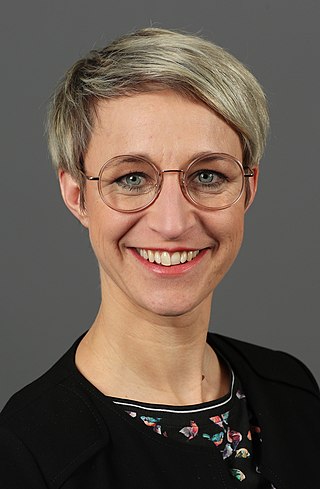
Nadine Schön is a German politician of the Christian Democratic Union (CDU) who has been serving as a member of the German Parliament since 2009, representing the constituency of St. Wendel.

Jens Georg Spahn is a German politician who served as Federal Minister of Health in the fourth cabinet of Chancellor Angela Merkel from 2018 to 2021. A member of the centre-right Christian Democratic Union (CDU), he has been the member of the lower house of the federal parliament, the Bundestag, for Steinfurt I – Borken I since 2002.
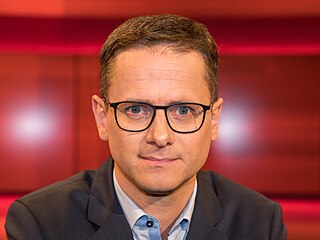
Carsten Christoffer Linnemann is a German economist and politician of the Christian Democratic Union (CDU) who has been a member of the German Bundestag since the 2009 election, representing Paderborn. Since 2022, he has been one of five deputy chairs of the CDU, under the leadership of chairman Friedrich Merz.

Helge Reinhold Braun is a German physician and politician of the Christian Democratic Union (CDU). Between 2018 and 2021, he served as Head of the Chancellery and Federal Minister for Special Affairs in the fourth coalition government of Chancellor Angela Merkel. He was the Parliamentary Secretary of State for Bureaucracy Reduction and Federal-State Relations at the Chancellery between 2013 and 2018.

The Leader of the Christian Democratic Union is the most senior political figure within the Christian Democratic Union of Germany. Since 31 January 2022, the office has been held by Friedrich Merz, who succeeded Armin Laschet.
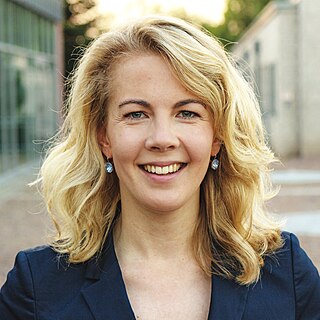
Linda Teuteberg is a German lawyer and politician of the Free Democratic Party (FDP). Serving as a member of the Bundestag since 2017, she was elected as General Secretary of the FDP on 26 April 2019 and thereby became part of the party's leadership around chairman Christian Lindner. Lindner asked for and received her resignation effective 19 September 2020.

Kai Wegner is a German politician of the Christian Democratic Union (CDU) who has been serving as Governing Mayor of Berlin since April 2023. He served as a member of the Bundestag, the German federal parliament, from 2005 to 2021. In 2019, he became the chairman of the CDU in Berlin.
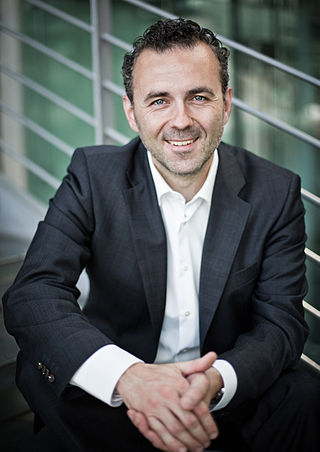
Thomas Jarzombek is a German politician of the Christian Democratic Union (CDU) who has been serving as a member of the Bundestag from the state of North Rhine-Westphalia since 2009.

Sabine Katharina Weiss is a German lawyer and politician of the Christian Democratic Union (CDU) who has been serving as a member of the Bundestag from the state of North Rhine-Westphalia since 2009.
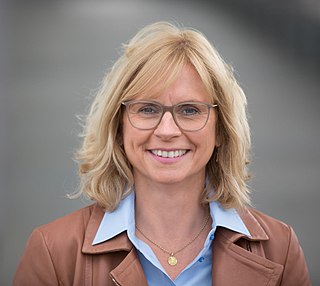
Andrea Lindholz is a German lawyer and politician of the Christian Social Union (CSU) who has been serving as a member of the Bundestag from the state of Bavaria since 2013. She represents the Aschaffenburg constituency.

Joachim Starbatty is a German professor of economics and politician.
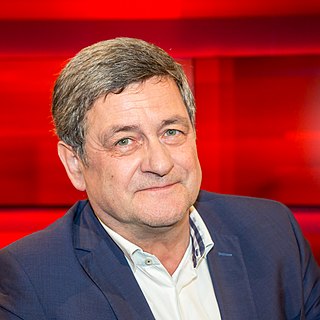
Roland Tichy is a German author, economist and journalist.



















